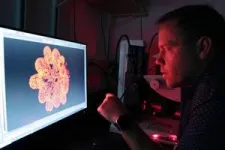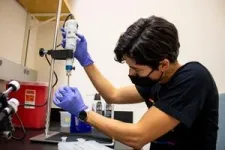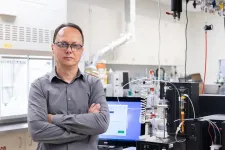(Press-News.org) Baltimore, MD—New work led by Carnegie’s Phillip Cleves uses cutting-edge CRISPR/Cas9 genome editing tools to reveal a gene that’s critical to stony corals’ ability to build their reef architectures. It is published in Proceedings of the National Academy of Sciences.
Stony corals are marine invertebrates that build large skeletons, which form the basis of reef ecosystems. These biodiversity hotspots are home to about a quarter of known marine species.
“Coral reefs have tremendous ecological value,” said Cleves. “But they are in decline due to human activity. Carbon pollution that we spew into the air is both warming oceans—causing fatal bleaching events—and altering seawater chemistry—resulting in ocean acidification that impedes reef growth.”
Over time, the excess carbon dioxide released into our atmosphere by burning fossil fuels is taken up into the ocean, where it reacts with the water to form an acid that is corrosive to coral, shellfish, and other marine organisms.
Stony corals are vulnerable to ocean acidification because they construct their skeletons by the accretion of calcium carbonate, a process called calcification, which becomes increasingly difficult as the surrounding water’s pH decreases. Because of the importance of coral skeleton formation in building reefs, a major research focus has been to understand the genes controlling the process and how it has evolved in corals.
For several years, Cleves’ lab has used the Nobel Prize-winning CRISPR/Cas9 technology to identify cellular and molecular processes that could help guide coral conservation and rehabilitation efforts. For example, they previously revealed a gene that is critical to how a coral responds to heat stress—information that may help predict how corals will handle future bleaching events.
Now, his team—including Carnegie’s Amanda Tinoco—used genome editing tools to determine that a particular gene, called SLC4γ, is required for young coral colonies to begin building their skeletons. The protein it encodes is responsible for transporting bicarbonate across cellular membranes. Interestingly, SLC4γ is only present in stony corals, but not in their non-skeleton-forming relatives. Together, these results imply that stony corals used the novel gene, SLC4γ, to evolve skeleton formation.
“By applying cutting-edge molecular biology techniques to pressing environmental problems, we can reveal the genes that determine ecologically important traits.” Cleves concluded. “In developing these genetic tools to study coral biology, we can greatly improve our understanding of their biology and learn how to mount successful conservation efforts for these fragile communities.”
Earlier this year, Cleves was selected by The Pew Charitable Trusts as one of seven recipients of the 2023 Pew Fellowship in Marine Conservation and the first researcher to receive the organization’s Marine and Biomedical Science Fellowship. This program supports research that applies techniques or technologies more commonly used in biomedical science to enhance marine conservation.
Other co-authors on the study include Carnegie’s Lorna Mitchison-Field, Jacob Bradford and Dimitri Perrin of Queensland University of Technology, Christian Renicke and John Pringle of Stanford University, and Line Bay of the Australian Institute of Marine Science.
__________________
This work was funded by start-up funds from the Carnegie Institution for Science, an International Macquarie University Research Excellence Scholarship, an Australian Institute for Marine Science internal grant, an NSF-IOS EDGE grant, and a Simons Foundation grant.
The Carnegie Institution for Science (carnegiescience.edu) is a private, nonprofit organization headquartered in Washington, D.C., with three research divisions on both coasts. Since its founding in 1902, the Carnegie Institution has been a pioneering force in basic scientific research. Carnegie scientists are leaders in the life and environmental sciences, Earth and planetary science, and astronomy and astrophysics.
END
CRISPR/Cas9 reveals a key gene involved in the evolution of coral skeleton formation
CRISPR/Cas9 technology helps identify cellular and molecular processes that could guide coral conservation and rehabilitation efforts
2023-06-05
ELSE PRESS RELEASES FROM THIS DATE:
Human factors affect bees’ communication, researchers find
2023-06-05
Human influences have the potential to reduce the effectivity of communication in bees adding further stress to struggling colonies, according to new analysis.
Scientists at the University of Bristol studying honeybees, bumblebees and stingless bees found that variation in communication strategies are explained by differences in the habitats that bees inhabit and differences in the social lifestyle such colony size and nesting habits.
The findings, published today in PNAS, reveal that anthropogenic change, such as habitat conversion, climate change and the use of agrochemicals, are altering the world bees occupy, and it is becoming increasingly clearer that this affects communication ...
Coaxing hair growth in aging hair follicle stem cells
2023-06-05
· Regulating cell mechanics stimulates hair growth in mice
· Next step will be testing if delivering microRNA via nanoparticles grows hair
· Potential for human hair growth
CHICAGO --- Just as people’s joints can get stiff as they age and make it harder for them to move around, hair follicle stem cells also get stiff, making it harder for them to grow hair, reports a new Northwestern Medicine study.
But if the hair follicle’s stem cells are softened, ...
Cure Mito Foundation launches resource on Leigh syndrome
2023-06-05
McKinney, TX., June 5, 2023 - The Cure Mito Foundation, a parent-led organization dedicated to advancing research and treatments for Leigh syndrome, has launched the first-of-its-kind online resource about Leigh syndrome, the most common type of pediatric mitochondrial disease.
The free resource, “About Leigh Syndrome” (https://www.aboutleighsyndrome.com), serves as a central place where patients, caregivers and doctors can find information on Leigh syndrome, including its symptoms, diagnosis, treatment options, and more. Translation ...
Tools to assess crime risk for young cohorts are likely to fail over time if they ignore social change
2023-06-05
Risk assessment instruments (RAIs) are widely used to inform high-stakes decision making in the criminal justice system and other areas, such as health care and child welfare. These tools typically assume a relation between predictors and outcomes that does not vary with time. But because societies change, this assumption may not hold in all settings, generating what a new study calls cohort bias—a bias resulting from cohort-wide influences not experienced by past or future cohorts.
The study, by researchers ...
Direct air capture technology licensed to Knoxville-based Holocene
2023-06-05
An innovative and sustainable chemistry developed at the Department of Energy’s Oak Ridge National Laboratory for capturing carbon dioxide from air has been licensed to Holocene, a Knoxville-based startup focused on designing and building plants that remove carbon dioxide from atmospheric air.
“ORNL is tackling climate change by developing numerous technologies that reduce or eliminate emissions,” said Susan Hubbard, ORNL deputy for science and technology. “But with billions ...
Fetal exposure to PCBs affects hearing health later in life
2023-06-05
Music, mice, and microscopic imaging combine to provide new insight into the effects of environmental chemicals on hearing loss.
Researchers at the Beckman Institute for Advanced Science and Technology found that early exposure to an environmental chemical called polychlorinated biphenyls, or PCBs, made it more difficult for mice to recover from sound-related trauma sustained later in life.
Their paper appears in the Journal of Neuroscience.
PCBs are carcinogenic compounds formerly used in industrial and consumer products. Although they were banned in the United States in 1979 and haven’t seen industrial use in decades, their highly ...
Quantum computers are better at guessing, new study demonstrates
2023-06-05
Daniel Lidar, the Viterbi Professor of Engineering at USC and Director of the USC Center for Quantum Information Science & Technology, and first author Dr. Bibek Pokharel, a Research Scientist at IBM Quantum, achieved this quantum speedup advantage in the context of a “bitstring guessing game.” They managed strings up to 26 bits long, significantly larger than previously possible, by effectively suppressing errors typically seen at this scale. (A bit is a binary number that is either zero or one).
Quantum computers promise to solve certain problems with an advantage that increases as the ...
New discoveries about where atherosclerotic plaques rupture can lead to preventive treatments
2023-06-05
A common cause of myocardial infarction and stroke is the rupture of atherosclerotic plaques. The exact location of plaque ruptures has previously been unknown, but now researchers at Lund University have mapped this. The research team has also identified an enzyme, a marker, that they hope will help predict who is at risk of having a myocardial infarction or a stroke due to a ruptured atherosclerotic plaque.
In atherosclerosis , fat is accumulated in the artery walls creating atherosclerotic ...
Webb Space Telescope detects universe’s most distant complex organic molecules
2023-06-05
CHAMPAIGN, Ill. — Researchers have detected complex organic molecules in a galaxy more than 12 billion light-years away from Earth – the most distant galaxy in which these molecules are now known to exist. Thanks to the capabilities of the recently launched James Webb Space Telescope and careful analyses from the research team, a new study lends critical insight into the complex chemical interactions that occur in the first galaxies in the early universe.
University of Illinois Urbana-Champaign astronomy and physics professor Joaquin Vieira and graduate student Kedar Phadke collaborated with researchers at Texas A&M ...
Zoonoses: Welcome to Professor Fernando Rosado Spilki, the new Executive Editor-in-Chief
2023-06-05
As the Co-Editors-in-Chief of Zoonoses, Dr. Lynn Soong (University of Texas Medical Branch, TX, USA) and Dr. Xiaoping Dong (Chinese Center for Disease Control & Prevention, Beijing, China) extend a warm welcome to Dr. Fernando Rosado Spilki, new Executive Editor-in-Chief (Vector Biology/Epidemiology) of Zoonoses.
Dr. Spilki is currently a Professor in the Institute of Health Sciences at Feevale University, Novo Hamburgo, Brazil. He received B.S. in Veterinary Medicine (2001), M.S. in Veterinary Sciences/Animal Virology (2004) both from the Universidade Federal do Rio Grande do Sul, and his Ph.D. in Genetics & Molecular ...
LAST 30 PRESS RELEASES:
NJIT faculty named Senior Members of the National Academy of Inventors
App aids substance use recovery in vulnerable populations
College students nationwide received lifesaving education on sudden cardiac death
Oak Ridge National Laboratory launches the Next-Generation Data Centers Institute
Improved short-term sea level change predictions with better AI training
UAlbany researchers develop new laser technique to test mRNA-based therapeutics
New water-treatment system removes nitrogen, phosphorus from farm tile drainage
Major Canadian study finds strong link between cannabis, anxiety and depression
New discovery of younger Ediacaran biota
Lymphovenous bypass: Potential surgical treatment for Alzheimer's disease?
When safety starts with a text message
CSIC develops an antibody that protects immune system cells in vitro from a dangerous hospital-acquired bacterium
New study challenges assumptions behind Africa’s Green Revolution efforts and calls for farmer-centered development models
Immune cells link lactation to long-lasting health
Evolution: Ancient mosquitoes developed a taste for early hominins
Pickleball players’ reported use of protective eyewear
Changes in organ donation after circulatory death in the US
Fertility preservation in people with cancer
A universal 'instruction manual' helps immune cells protect our organs
Fifteen-year results from SWOG S0016 trial suggest follicular lymphoma is curable
The breasts of a breastfeeding mother may protect a newborn from the cold – researchers offer a new perspective on breast evolution
More organ donations now come from people who die after their heart stops beating
How stepping into nature affects the brain
Study: Cancer’s clues in the bloodstream reveal the role androgen receptor alterations play in metastatic prostate cancer
FAU Harbor Branch awarded $900,000 for Gulf of America sea-level research
Terminal ileum intubation and biopsy in routine colonoscopy practice
Researchers find important clue to healthy heartbeats
Characteristic genomic and clinicopathologic landscape of DNA polymerase epsilon mutant colorectal adenocarcinomas
Start school later, sleep longer, learn better
Many nations underestimate greenhouse emissions from wastewater systems, but the lapse is fixable
[Press-News.org] CRISPR/Cas9 reveals a key gene involved in the evolution of coral skeleton formationCRISPR/Cas9 technology helps identify cellular and molecular processes that could guide coral conservation and rehabilitation efforts






